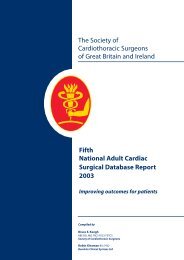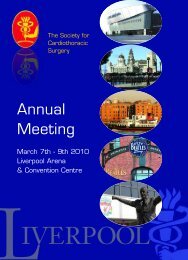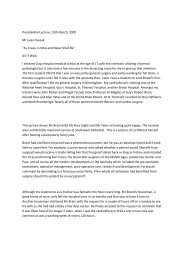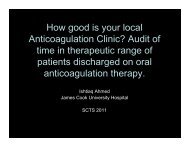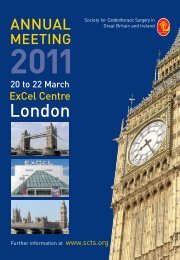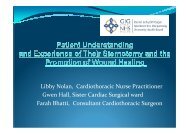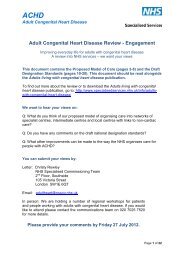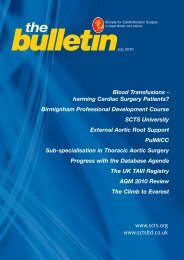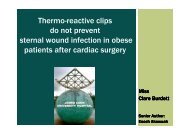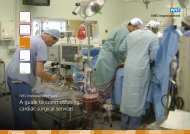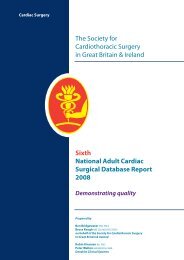Download - Society for Cardiothoracic Surgery
Download - Society for Cardiothoracic Surgery
Download - Society for Cardiothoracic Surgery
Create successful ePaper yourself
Turn your PDF publications into a flip-book with our unique Google optimized e-Paper software.
10 theBulletin<br />
December 2011<br />
Trainees’ Group<br />
Report<br />
Betsy Evans<br />
As the end of 2011 approaches one inevitably looks back over<br />
the year to reflect on the major events that have occurred.<br />
This year has been a very busy one. Helping to organise the<br />
trainee session at the annual meeting in March was both<br />
enjoyable and in<strong>for</strong>mative. I think that the meeting was the best<br />
attended that I have seen over the last decade. The involvement<br />
of trainees presenting papers that had direct relevance to the<br />
group was appreciated by the audience. It was good to get<br />
personal views from a spread of trainees covering various topics<br />
– national selection process, preparation <strong>for</strong> the FRCS (CTh)<br />
exam and the changing role of trainees within cardiothoracic<br />
departments. Feedback from trainees revealed that they had<br />
learnt from the meeting and also felt empowered to return to<br />
their units with ideas to propose to their training programme<br />
directors regarding the balance between service and training<br />
within the constraints of EWTD compliant rotas.<br />
Symposium<br />
Additional to the trainees meeting I was invited to present in the<br />
symposium organised by Prof Marjan Jahangiri on the EWTD.<br />
This session was attended by many, despite being at the end of<br />
the meeting program, and a balanced series of presentations<br />
was given addressing the views of a wide range of professionals<br />
on EWTD – managerial, senior clinicians, trainees and overseers<br />
of our training (Royal College and SAC) were represented. I<br />
believe that despite this topic being discussed on numerous<br />
occasions this was the most insightful symposium that I have<br />
been to on the subject which hopefully will inspire people to<br />
keep addressing the plight of surgical trainees in an era of<br />
restricted working time.<br />
At the annual meeting it was announced that Ethicon would be<br />
sponsoring four senior trainees to spend 6 months at the end of<br />
their training in an area of specialist surgery. This opportunity<br />
would enable the trainees to gain additional expertise in a field<br />
of cardiothoracic surgery that they wished to take to their<br />
prospective consultant post. The Ethicon scholarships were very<br />
popular with a competitive interview process determining the<br />
successful applicants. The four individuals chose to spend their<br />
time in Liverpool, Middlesbrough, Belgium and Hong Kong. I look<br />
<strong>for</strong>ward to hearing the presentations on how their time is being<br />
spent at the <strong>for</strong>th-coming annual meeting in Manchester next<br />
year.<br />
Trainee Selection<br />
In April the national selection <strong>for</strong> cardiothoracic trainees was<br />
moved to Southampton from Birmingham and the process<br />
followed a similar <strong>for</strong>mat with three days of interview,<br />
presentation and simulated surgical tasks being assessed. In<br />
total there were twenty eight successful candidates awarded a<br />
national training number, congratulations go to all of these<br />
individuals. <strong>Cardiothoracic</strong> surgery still attracts many high<br />
calibre people and hopefully will always continue to do so. It is<br />
the strength of our trainees together with the commitment of<br />
trainers and members of the SAC that continue to produce a top<br />
quality surgeon at the end of the program and we must always<br />
endeavour to achieve this.<br />
Training Differences<br />
This June the summer cardiothoracic section of the Royal <strong>Society</strong><br />
of Medicine was organised <strong>for</strong> the final time by Prof John Pepper,<br />
the title <strong>for</strong> the meeting was “The Future of <strong>Cardiothoracic</strong><br />
Surgical Training in the UK”. The day was spent discussing<br />
training differences between the UK, Europe and the United<br />
States, the relevance of simulation in cardiothoracic training in<br />
addition to the need <strong>for</strong> trainees to be open minded about how<br />
to achieve the best from their time as a trainee with a reflection<br />
on the history of surgical training. Overall the day was packed<br />
with in<strong>for</strong>mative, stimulating presentations offering open<br />
discussion in a relaxed setting. This day again stressed to me<br />
that as a trainee we must step back and appreciate that there are<br />
many people who take our training seriously we just need to tap<br />
into these very useful resources!<br />
Feedback from trainees at the AGM reveals<br />
that they felt empowered to return to their<br />
units with ideas to propose to their<br />
training programme directors<br />
Exciting times are ahead <strong>for</strong> training in our specialty with GMC<br />
recognition that congenital cardiac surgery is now a subspecialty<br />
of cardiothoracic surgery; this will hopefully have a beneficial<br />
effect on any persons wishing to train in this field. The<br />
intercollegiate examination can now be sat at the end of the<br />
fourth year of specialty training thus enabling future trainees the<br />
flexibility to tailor the last two years of their training to an area of<br />
specialist interest including congenital cardiac surgery. Issues<br />
regarding the nature of the clinical aspect of the examination<br />
with regards to cardiac and thoracic interest of the trainee are<br />
being discussed and continued feedback is crucial from<br />
individuals who have recently sat the examination to assist this<br />
process.<br />
A final note, I hope that trainees believe that I am representing<br />
the group effectively at various committee meetings that I attend<br />
I obviously am acutely aware of numerous requests made of<br />
trainees but really can not stress enough the importance of<br />
communication! At the next annual meeting I will be passing on<br />
the role of trainee representative. I am confident that this<br />
important role will be taken on by an enthusiastic trainee. It is<br />
anticipated that e-mail will be the medium used <strong>for</strong> the voting<br />
process and that this will occur sometime in February so to<br />
ensure my successor can be announced at the Annual meeting in<br />
April.



